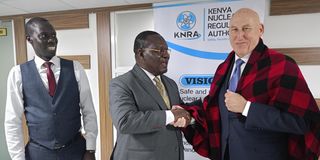Kenya's nuclear regulator upbeat about deal with US firm Excel Services Corporation

Kenya Nuclear Regulatory Authority (KNRA) Chairman Omondi Anyanga (centre) greets Excel Services Corporation CEO Donald Hoffman as KNRA Director-General James Keter looks on in Nairobi on July 19, 2023. The officials discussed ways to strengthen nuclear safety.
Kenya will work closely with experts and industry leaders to achieve high safety standards as it races to launch its first nuclear power plant by 2038.
This came as the Kenya Nuclear Regulatory Authority (KNRA) agreed on a partnership with a leading US nuclear company in Nairobi on Wednesday, July 19, 2023.
KNRA Chairman Omondi Anyanga and Director General James Keter met with Donald Hoffman, CEO of Excel Services Corporation, and discussed ways to tap into the company's expertise in key areas, including improving regulatory safeguards.
Excel Corporation supports nuclear energy producers and focuses on programmes to improve safety and security. Its expertise includes feasibility studies, site selection and environmental assessment.
The meeting led to the possibility of Kenya receiving assistance from the US State Department for training and improving procedures and programmes.
Technology assessments
“When we started 38 years ago, we had a clear vision…We help countries learn from what was good or what was bad and then get to make things better,” Mr Hoffman said, adding: “It is important to learn from what other countries did or didn’t do and how they succeeded or failed.”
He said the company would work with Kenya and other regulators in the region, starting with technology assessments, to achieve effective regulation. He warned that weak guidelines would inevitably reverse the gains made in nuclear safety.
He said: "People remember tragedies like Chernobyl, Hiroshima and Nagasaki, but may not acknowledge the thousands of successful nuclear reactors that have been built."
Kenya hopes to have its first nuclear power plant by 2038, a process championed by the Nuclear Power and Energy Agency (NuPEA). KNRA officials said that as the regulator, the agency has a central role to play in ensuring the success of the power programme.
Describing the meeting as a "breakthrough", Mr Anyanga said Kenya was open to learning from industry leaders. "Your partnership with us is timely. We will work closely together and are ready to sign all the necessary documents so that we can hit the ground running," he said.
At the same time, Mr Keter stressed the importance of effective regulation, saying it helps build public confidence in nuclear programmes.
Abuses of nuclear power
"We have various players in the sector, but obviously the buck always stops with the regulator," he said.
He said the KNRA was determined to enhance its regulatory work to a level acceptable to the global nuclear regulatory community and to deter abuse. Abuses of nuclear power in the past have included the manufacture of crude weapons and contamination of the environment.
Mr Anyanga and Mr Keter were accompanied at the meeting by KNRA Directors John Opar and Shadrack and Tracy Kabochi, Deputy Director for Legal Affairs. Mr Kiti made a presentation detailing the achievements and challenges of the authority's work, including resource constraints, as it recently embarked on drafting its regulations.
Kenya's partnership with Excel comes in the wake of a memorandum of understanding signed with the US as part of the Foundational Infrastructure for Responsible Use of Small Modular Reactor Technology (FIRST Project), an initiative stemming from US President Joe Biden's Leaders' Summit on Climate 2021.
The project provides capacity building to nearly 20 partner countries seeking to establish or expand their nuclear energy programmes to meet clean energy needs while maintaining the highest standards of nuclear safety, security and non-proliferation.
The KNRA, a successor to the Radiation Protection Board, is responsible for protecting people, property and the environment from the harmful effects of radiation.


